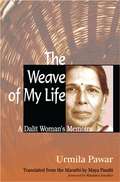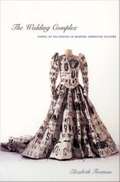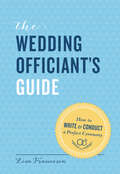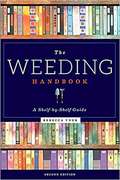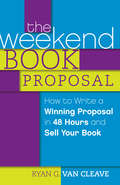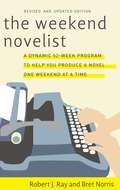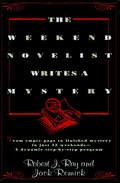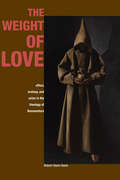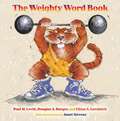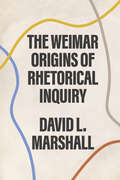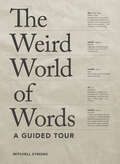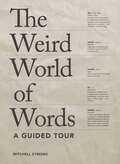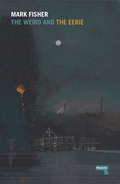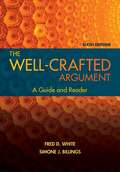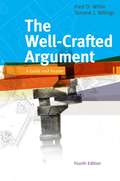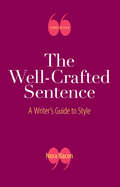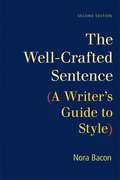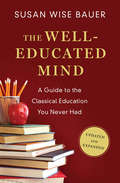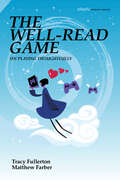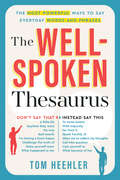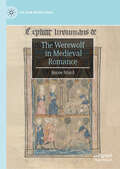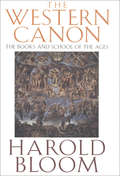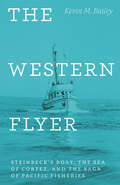- Table View
- List View
The Weave of My Life: A Dalit Woman's Memoirs
by Maya Pandit Urmila PawarHow a member of India's lowest caste became a crusader for human rights.
The Wedding Complex: Forms of Belonging in Modern American Culture
by Elizabeth FreemanIn The Wedding Complex Elizabeth Freeman explores the significance of the wedding ceremony by asking what the wedding becomes when you separate it from the idea of marriage. Freeman finds that weddings--as performances, fantasies, and rituals of transformation--are sites for imagining and enacting forms of social intimacy other than monogamous heterosexuality. Looking at the history of Anglo-American weddings and their depictions in American literature and popular culture from the antebellum era to the present, she reveals the cluster of queer desires at the heart of the "wedding complex"--longings not for marriage necessarily but for public forms of attachment, ceremony, pageantry, and celebration. Freeman draws on queer theory and social history to focus on a range of texts where weddings do not necessarily lead to legal marriage but instead reflect yearnings for intimate arrangements other than long-term, state-sanctioned, domestic couplehood. Beginning with a look at the debates over gay marriage, she proceeds to consider literary works by Nathaniel Hawthorne, William Faulkner, Carson McCullers, Vladimir Nabokov, and Edgar Allan Poe, along with such Hollywood films as Father of the Bride, The Graduate, and The Godfather. She also discusses less well-known texts such as Su Friedrich's experimental film First Comes Love and the off-Broadway, interactive dinner play Tony 'n' Tina's Wedding. Offering bold new ways to imagine attachment and belonging, and the public performance and recognition of social intimacy, The Wedding Complex is a major contribution to American studies, queer theory, and cultural studies.
The Wedding Officiant's Guide: How to Write & Conduct a Perfect Ceremony
by Lisa FrancescaSay “I do” to tying the knot. “Officiant Lisa Francesca has literally written the book on how to plan the perfect ceremony.” —Martha Stewart WeddingsAccording to a 2019 WeddingWire report based on data from more than 18,000 newlyweds, only twenty-five percent of weddings are taking place in religious institutions. More than one in three American weddings are being officiated by a friend or family member. With the officiating trend on the rise, novice officiants need a resource to guide them. In The Wedding Officiant’s Guide, interfaith minister Lisa Francesca breaks down the entire officiating process, from becoming an ordained officiant and interviewing the couple to drafting and performing a moving ceremony. Written in an engaging and friendly tone, and featuring empowering advice, suggested readings, stories and lessons learned from new officiants, and practical tips from wedding planners, this inviting handbook will help new officiants write and deliver a wedding ceremony that fulfills marriage laws, delights guests, and honors the marrying couple.
The Weeding Handbook: A Shelf-by-shelf Guide
by Rebecca VnukFilled with field-tested strategies and adaptable collection development policies, this updated handbook will enable libraries to bloom by maintaining a collection that users actually use. "Manages to be a thorough and informative source on weeding library collections and yet also an easy, engaging read ... Recommended." That rave review from Technicalities sums up the acclaim and appeal of this bestselling resource’s first edition. Now Vnuk has revised and updated her text to keep pace with libraries’ longer-term shifts in collection development and access, such as a growing emphasis on digital collections and managing duplicate physical materials. She demonstrates how weeding helps a library thrive by focusing its resources on those parts of the collection that are the most useful to its users. Walking collections staff through the proverbial stacks shelf by shelf, this book includes a new “Tales from the Front” feature, providing real-life case studies of librarians working on weeding projects; explains why weeding is important for a healthy library and how it can positively affect library budgets; systematically walks readers through a library's shelves, with recommended weeding criteria and call-outs in each area for the different considerations of large collections and smaller collections; offers easily adaptable, updated sample development plans which reflect the latest thinking in collection development; advises readers on weeding problematic materials, such as those that include racist themes and depictions; presents updated and expanded guidance on special considerations for youth collections; addresses reference, media, magazines and newspapers, e-books, and other special materials; shares guidance for determining how to delegate responsibility for weeding, plus pointers for getting other staff members on board; and gives advice for educating the community about the process, how to head off PR disasters, and what to do with weeded materials.
The Weekend Book Proposal: How to Write a Winning Proposal in 48 Hours and Sell Your Book
by Ryan G. Van CleaveWrite Better Proposals Faster to Accelerate Your Writing Career! Whether you are a true beginner or a seasoned writer looking to secure more book contracts, The Weekend Book Proposal shows you how to take your best ideas and create powerful proposals--quickly and professionally. No need to spend months laboring over a proposal when in just a few days you can write one that will ignite the interest of agents and editors. Ryan G. Van Cleave presents the tools you need to craft an eye-grabbing proposal for your nonfiction, memoir, anthology, textbook, novel, and more. Jam-packed with proven strategies, nuts-and-bolts advice, sample queries and proposals, interviews with publishing experts, and "Hit the Gas" tips for speeding up the proposal process, The Weekend Book Proposal will show you how to succeed and prosper as a writer--and sell your books before you've even written them! The Weekend Book Proposal explains how to: Write a catchy title and book description. Create a compelling author bio and chapter outline. Develop a targeted, engaging concept statement. Build a strong marketing plan and endorsements list. Structure your proposals based on those crafted by successful authors.
The Weekend Novelist
by Robert J. Ray Bret NorrisWho doesn't dream of writing a novel while holding on to a day job? Robert J. Ray and coauthor Bret Norris can help readers do just that, with this proven practical and accessible step-by-step guide to completing a novel in just a year's worth of weekends. The Weekend Novelist shows writers of all levels how to divide their writing time into weekend work sessions, and how to handle character, scene, and plot. This new, revised version is far more skills-based than its predecessor, and includes both classic and contemporary literature models, contains a sample "Novel in Progress," and at the end offers readers the choice to rewrite their novel, draft a memoir, or turn their rough draft into a screenplay. Readers for a decade have been instructed and inspired by The Weekend Novelist. This new edition will help many more strive to realize their writing potential.* Offers a practical, structured approach to finishing a novel* Ray has taught more than 10,000 students over 25 years and continues to teach new classes that attract new readers to his books* Replaces ISBN: 0-4405-0594-1From the Trade Paperback edition.
The Weekend Novelist Writes a Mystery
by Robert J. RayLike Agatha Christie and Raymond Chandler, Sara Paretsky and Thomas Harris, you, too, can learn the trade secrets of quality detective fiction.It's true. Just one year from now, you can deliver a completed mystery novel to a publisher--by writing only on weekends. Authors Robert J. Ray and Jack Remick guide you through the entire mystery-writing process, from creating a killer to polishing off the final draft. Each weekend you'll focus on a specific task--learning the basics of novel-writing, the special demands of mystery-writing, and the secrets professionals use to create stories one scene at a time, building to a shivery, satisfying climax. Using Agatha Christie's The Body in the Library as a model for the classical mystery tale and Martin Cruz Smith's Gorky Park for the hard-boiled mystery, this unique step-by-step program gives you all the information you need to reach your ultimate goal: a finished book in just 52 weeks! Let two successful masters of the genre show you how...Discover: Why you must create your killer first The tricks to writing dialogue that does it all--moves your plot, involves your reader, and makes your style sizzle How to "bury" information (and corpses) for your reader to find Why you should NOT build your book around chapters Special techniques for clearing writer's block Plus: examples from Sue Grafton, Dashiell Hammett, Patricia Cornwell, Thomas Harris, Raymond Chandler, and more.From the Trade Paperback edition.
The Weight of Love: Affect, Ecstasy, and Union in the Theology of Bonaventure
by Robert Glenn DavisSupplementing theological interpretation with historical, literary, and philosophical perspectives, The Weight of Love analyzes the nature and role of affectivity in medieval Christian devotion through an original interpretation of the writings of the Franciscan theologian Bonaventure. It intervenes in two crucial developments in medieval Christian thought and practice: the renewal of interest in the corpus of Dionysius the Areopagite in thirteenth-century Paris and the proliferation of new forms of affective meditation focused on the passion of Christ in the later Middle Ages. Through the exemplary life and death of Francis of Assisi, Robert Glenn Davis examines how Bonaventure traces a mystical itinerary culminating in the meditant’s full participation in Christ’s crucifixion. For Bonaventure, Davis asserts, this death represents the becoming-body of the soul, the consummation and transformation of desire into the crucified body of Christ.In conversation with the contemporary historiography of emotions and critical theories of affect, The Weight of Love contributes to scholarship on medieval devotional literature by urging and offering a more sustained engagement with the theological and philosophical elaborations of affectus. It also contributes to debates around the “affective turn” in the humanities by placing it within this important historical context, challenging modern categories of affect and emotion.
The Weighty Word Book
by Paul M. Levitt Douglas A. Burger Guralnick S. Elissa[The Weighty Word Book] will appeal to kids who want to sound as smart as they are. It offers a clever, funny way to introduce new words into the vocabulary. . . . There's one word for every letter of the alphabet--wait until you see what they do with dogmatic, juxtapose and zealot.--The Gazette (Colorado Springs, Colorado) Each of these twenty-six short stories takes an elaborate, circuitous path that leads to a 'weighty' one-word punch line. . . . It's a creative and humorous approach to vocabulary building, and a natural lead in to having students create their own tall tales with multisyllabic conclusions.--School Library Journal
The Weimar Origins of Rhetorical Inquiry
by David L. MarshallThe Weimar origins of political theory is a widespread and powerful narrative, but this singular focus leaves out another intellectual history that historian David L. Marshall works to reveal: the Weimar origins of rhetorical inquiry. Marshall focuses his attention on Martin Heidegger, Hannah Arendt, Walter Benjamin, and Aby Warburg, revealing how these influential thinkers inflected and transformed problems originally set out by Max Weber, Carl Schmitt, Theodor Adorno, Hans Baron, and Leo Strauss. He contends that we miss major opportunities if we do not attend to the rhetorical aspects of their thought, and his aim, in the end, is to lay out an intellectual history that can become a zone of theoretical experimentation in para-democratic times. Redescribing the Weimar origins of political theory in terms of rhetorical inquiry, Marshall provides fresh readings of pivotal thinkers and argues that the vision of rhetorical inquiry that they open up allows for new ways of imagining political communities today.
The Weird World of Words: A Guided Tour
by Mitchell SymonsDid you know that 'Almost' is the longest word in the English language with all of its letters in alphabetical order? Or that 'Stewardesses' is the longest word you can type solely with your left hand? Or that fireflies aren't actually flies, they're beetles? From information about words and their uses, to useful lists of things you never knew had names, palindromes, famous lines from literature and film, bizarre test answers and more, The Weird World of Words is bursting with truly oddball facts about words and language - and will have you hooked from the very first page. Author Mitchell Symons was a principal writer of early editions of the board game Trivial Pursuit and is the author of over sixty books.
The Weird World of Words: A Guided Tour
by Mitchell SymonsDid you know that ‘Almost’ is the longest word in the English language with all of its letters in alphabetical order ? Or that ‘Stewardesses’ is the longest word you can type solely with your left hand? Or that fireflies aren’t actually flies, they’re beetles? From information about words and their uses, to useful lists of things you never knew had names, palindromes, famous lines from literature and film, bizarre test answers and more, The Weird World of Words is bursting with truly oddball facts about words and language—and will have you hooked from the very first page.
The Weird and the Eerie
by Mark FisherWhat exactly are the Weird and the Eerie? In this new essay, Mark Fisher argues that some of the most haunting and anomalous fiction of the 20th century belongs to these two modes. The Weird and the Eerie are closely related but distinct modes, each possessing its own distinct properties. Both have often been associated with Horror, yet this emphasis overlooks the aching fascination that such texts can exercise. The Weird and the Eerie both fundamentally concern the outside and the unknown, which are not intrinsically horrifying, even if they are always unsettling. Perhaps a proper understanding of the human condition requires examination of liminal concepts such as the weird and the eerie.These two modes will be analysed with reference to the work of authors such as H. P. Lovecraft, H. G. Wells, M.R. James, Christopher Priest, Joan Lindsay, Nigel Kneale, Daphne Du Maurier, Alan Garner and Margaret Atwood, and films by Stanley Kubrick, Jonathan Glazer and Christoper Nolan.
The Well-Crafted Argument: A Guide And Reader
by Fred D. White Simone J. BillingsNIMAC-sourced textbook
The Well-Crafted Argument: A Guide and Reader
by Fred D. White Simone J. BillingsThe Well-Crafted Argument equips students with a comprehensive set of skills necessary for writing argumentative essays in a wide variety of contemporary social contexts. Based on a process pedagogy that encourages individual voice and vision, the book introduces models of good writing for inexperienced writers. Divided into two parts, a rhetoric and a reader, it provides instructors and students with a wealth of materials and tools for effective argumentative writing, thinking, and reading.
The Well-Crafted Argument: A Guide and Reader (4th Edition)
by Fred D. White Simone J. BillingsIncorporating new articles, expanded commentary, and the latest changes from the 2009 MLA Handbook and 2009 APA Publication Manual, the 4th Edition of THE WELL-CRAFTED ARGUMENT guides students through the process of writing effective arguments across the disciplines. The two-part structure of this rhetoric/reader includes a complete pedagogical apparatus--with coverage of critical reading strategies, as well as writing, researching, and documenting a topic--and an anthology of readings grouped into nine thematic clusters. In-depth instruction, combined with real student writings, engages students and helps them discover their own voices. The Fourth Edition continues the visual emphasis from the 3rd Edition, while maintaining the authors' practical, skill-building approach. Each chapter in Part I ends with a "Summary," "Checklist," and "Writing Projects," while each cluster in Part II ends with "Connections Among the Clusters," "Writing Projects," and "Suggestions for Further Reading. " These sections encourage students to apply what they've learned and go beyond the classroom if a topic is of particular interest to them. In addition to guidance on drafting and revising arguments, the authors provide a variety of composition strategies, including freewriting, outlining, and shared reading.
The Well-Crafted Sentence: A Writer's Guide to Style
by Nora BaconWhat makes a sentence strong? Nora Bacon’s The Well-Crafted Sentence: A Writer’s Guide to Style demystifies grammatical concepts and stylistic choices by taking apart expert writers’ sentences as illustrations and asking students to practice crafting and revising their own. Examples throughout the text are excerpted from 11 readings collected in an anthology at the end of the book, so you can teach style in the context of a larger argument or narrative. With four new model texts, expanded explanations of grammatical concepts, and new coverage of figures of speech, the third edition invites students to experiment with sentence structures that make writing stronger.
The Well-Crafted Sentence: A Writer's Guide to Style (2nd Edition)
by Nora BaconGrounded in the art of writing, The Well-Crafted Sentence zeroes in on the building block of great prose: the sentence. With a friendly, approachable, and elegant tone, Nora Bacon shows the benefits of attention to style and offers a range of revision strategies that give students the tools to strengthen and develop their writing. Giving students the opportunity to see successful rhetorical choices at work in writing they admire, the text includes a brief anthology of readings by ten accomplished stylists, five of them new to this edition. Examples throughout the text are drawn from these model pieces, as are integrated exercises that help students apply concepts to their own writing. Additionally, a new first chapter, Approaches to Style, introduces students to the concept of style. Affordable and brief, The Well-Crafted Sentence works as a core classroom text or as a supplement.
The Well-Educated Mind: A Guide to the Classical Education You Never Had
by Susan Wise BauerAn engaging, accessible guide to educating yourself in the classical tradition. Have you lost the art of reading for pleasure? Are there books you know you should read but haven't because they seem too daunting? In The Well-Educated Mind, Susan Wise Bauer provides a welcome and encouraging antidote to the distractions of our age, electronic and otherwise. In her previous book, The Well-Trained Mind, the author provided a road map of classical education for parents wishing to home-school their children, and that book is now the premier resource for home-schoolers. In this new book, Bauer takes the same elements and techniques and adapts them to the use of adult readers who want both enjoyment and self-improvement from the time they spend reading. The Well-Educated Mind offers brief, entertaining histories of five literary genres--fiction, autobiography, history, drama, and poetry--accompanied by detailed instructions on how to read each type. The annotated lists at the end of each chapter--ranging from Cervantes to A. S. Byatt, Herodotus to Laurel Thatcher Ulrich--preview recommended reading and encourage readers to make vital connections between ancient traditions and contemporary writing. The Well-Educated Mind reassures those readers who worry that they read too slowly or with below-average comprehension. If you can understand a daily newspaper, there's no reason you can't read and enjoy Shakespeare's Sonnets or Jane Eyre. But no one should attempt to read the "Great Books" without a guide and a plan. Susan Wise Bauer will show you how to allocate time to your reading on a regular basis; how to master a difficult argument; how to make personal and literary judgments about what you read; how to appreciate the resonant links among texts within a genre--what does Anna Karenina owe to Madame Bovary?--and also between genres. Followed carefully, the advice in The Well-Educated Mind will restore and expand the pleasure of the written word.
The Well-Read Game: On Playing Thoughtfully (Playful Thinking)
by Tracy Fullerton Matthew FarberHow players evoke personal and subjective meanings through a new theory of player response.In The Well-Read Game, Tracy Fullerton and Matthew Farber explore the experiences we have when we play games: not the outcomes of play or the aesthetics of formal game structures but the ephemeral and emotional experiences of being in play. These are the private stories we tell ourselves as we play, the questions we ask, and our reactions to the game&’s intent. These experiences are called &“readings&” because they involve so many of the aspects of engaging with literary, cinematic, and other expressive texts. A game that is experienced in such a way can be called &“well-read,&” rather than, or as well as, &“well-played,&” because of the personal, interpretive nature of that experience and the way in which it relates to our reading of texts of all kinds.The concept of the &“well-read game&” exists at the convergence of literary, media, and play theories—specifically, the works of Louise Rosenblatt&’s reader-response theory, Brian Upton&’s situational game theory, Tracy Fullerton&’s playcentric design theory, and Bernie DeKoven&’s well-played game philosophy. Each of these theories, from their own perspective, challenges notions of a separate, objective, or authorial meaning in a text and underscores the richness that arises from the varied responses of readers, who coauthor the meaning of each text through their active engagement with it. When taken together, these theories point to a richer understanding of what a game is and how we might better value our experiences with games to become more thoughtful readers of their essential meanings.
The Well-Spoken Thesaurus: The Most Powerful Ways to Say Everyday Words and Phrases
by Tom HeehlerThe Well-Spoken Thesaurus is designed to help you improve your communication skills by expanding your vocabulary.The book includes over 200 words, arranged in easy-to-use categories, such as "positive emotions," "negative emotions," "intellectual terms," and "descriptive terms." Each entry includes a definition, synonyms, antonyms, and usage examples. The Well-Spoken Thesaurus is particularly useful for writers who want to improve the precision and impact of their language. By providing a range of synonyms for common words and phrases, the book helps writers avoid repetition and clichés, while also encouraging them to use language that is more vivid, specific, and memorable.Some of the benefits of using The Well-Spoken Thesaurus include:Making a stronger impression: By choosing words that are more precise and impactful, you can help your writing stand out from the crowd and make a stronger impression.Demonstrating your communication skills: Using a wide range of vocabulary can demonstrate that you are articulate, sophisticated, and able to communicate effectively.Conveying your personality: Includes a range of descriptive terms that can help you convey your personality and character traits in your writingOverall, The Well-Spoken Thesaurus can be a valuable resource for anyone who wants to improve their writing and communication skills.
The Well-Tempered Sentence: A Punctuation Handbook for the Innocent, the Eager and the Doomed
by Karen Elizabeth GordonEverything you ever wanted to know about punctuation marks using humorous examples.
The Werewolf in Medieval Romance (The New Middle Ages)
by Renée WardThe Werewolf in Medieval Romance argues that in Guillaume de Palerne, Bisclavret, Arthur and Gorlagon, Melion, William of Palerne, and Biclarel the werewolf&’s identity incorporates a variety of assemblages, including human and animal bodies, and physical spaces and the animate and inanimate beings or objects therein. Whether in lupine or human form, the werewolf&’s identity is a perpetual becoming, one with extensive queer, and thus disruptive, potential. Additionally, the werewolf&’s identity incorporates political systems and violence, specifically through his status as a knight, prince, and/or king. He is an expression of sovereign power and an extension of the identity the sovereign presents, often functioning as a blunt instrument of the crown.
The Western Canon: The Books and School of the Ages
by Harold BloomThe literary critic defends the importance of Western literature from Chaucer and Shakespeare to Kafka and Beckett in this acclaimed national bestseller.NOMINATED FOR THE NATIONAL BOOK CRITICS CIRCLE AWARDHarold Bloom's The Western Canon is more than a required reading list—it is a &“heroically brave, formidably learned&” defense of the great works of literature that comprise the traditional Western Canon. Infused with a love of learning, compelling in its arguments for a unifying written culture, it argues brilliantly against the politicization of literature and presents a guide to the essential writers of the western literary tradition (The New York Times Book Review).Placing William Shakespeare at the &“center of the canon,&” Bloom examines the literary contributions of Dante Alighieri, John Milton, Jane Austen, Emily Dickenson, Leo Tolstoy, Sigmund Freud, James Joyce, Pablo Neruda, and many others. Bloom's book, much-discussed and praised in publications as diverse as The Economist and Entertainment Weekly, offers a dazzling display of erudition and passion.&“An impressive work…deeply, rightly passionate about the great books of the past.&”—Michel Dirda, The Washington Post Book World
The Western Flyer: Steinbeck's Boat, the Sea of Cortez, and the Saga of Pacific Fisheries
by Kevin M. BaileyIn January 2010, the Gemini was moored in the Swinomish Slough on a Native American reservation near Anacortes, Washington. Unbeknownst to almost everyone, the rusted and dilapidated boat was in fact the most famous fishing vessel ever to have sailed: the original Western Flyer, immortalized in John Steinbeck's nonfiction classic The Log from the Sea of Cortez. In this book, Kevin M. Bailey resurrects this forgotten witness to the changing tides of Pacific fisheries. He draws on the Steinbeck archives, interviews with family members of crew, and more than three decades of working in Pacific Northwest fisheries to trace the depletion of marine life through the voyages of a single ship. After Steinbeck and his friend Ed Ricketts--a pioneer in the study of the West Coast's diverse sea life and the inspiration behind "Doc" in Cannery Row--chartered the boat for their now-famous 1940 expedition, the Western Flyer returned to its life as a sardine seiner in California. But when the sardine fishery in Monterey collapsed, the boat moved on: fishing for Pacific ocean perch off Washington, king crab in the Bering Sea off Alaska, and finally wild Pacific salmon--all industries that would also face collapse. As the Western Flyer herself faces an uncertain future--a businessman has bought her, intending to bring the boat to Salinas, California, and turn it into a restaurant feature just blocks from Steinbeck's grave--debates about the status of the California sardine, and of West Coast fisheries generally, have resurfaced. A compelling and timely tale of a boat and the people it carried, of fisheries exploited, and of fortunes won and lost, The Western Flyer is environmental history at its best: a journey through time and across the sea, charting the ebb and flow of the cobalt waters of the Pacific coast.
